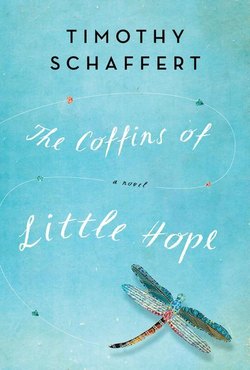Читать книгу The Coffins of Little Hope - Timothy Schaffert - Страница 14
На сайте Литреса книга снята с продажи.
· 8 ·
ОглавлениеA LITTLE FAMILY TREE:
My grandson, Doc, lived with his niece, Tiff (short for Tiffany), in a little house across the street from me, a house they’d named the Artichoke Heart, for its green shingles. Doc’s sister, Tiff’s mother, had abandoned Tiff and fled to Paris six years before. It hadn’t surprised any of us when Ivy had just up and left; what had surprised us was that she’d been so devoted to Tiff for the first seven years of the girl’s life. Ivy had not been a junkie or a drunk—she’d been too uncommitted to anything to be an addict of any kind.
There’s a pioneer graveyard out in the country, one you have to know about to find, as it’s tucked far back off the road and hidden by the drape of overgrown weeping willows. On the afternoon of Lenore’s disappearance, before we knew of all that was to possess us, Tiff and I went to the graveyard. I let Tiff drive once we turned off the paved roads. She had to stretch her leg and tippy her toes to press at the gas. She drove slowly, unbearably slowly, but when I snapped at her to speed up, she snapped back. “Please, Essie!” she said. “You make me too damn nervous!” But it was endless, her driving.
Tiff and I stopped at the railroad tracks to pick wildflowers from the ditch to take to the cemetery to decorate the graves. A century of rain had worn away many of the names on the limestone, but dates remained, and Tiff held paper against the stone and ran a piece of charcoal over it to make rubbings of the most tragic dates—six days; eight days; two months. She made rubbings of carvings of babies with wings and of children riding on the backs of lithe dogs. She took pictures with a semi-expensive digital camera Doc had given her to encourage ambitions in journalism.
As she snapped photos of an angel with no dots in her marble eyes, I sat on a stone bench, my back against a wrought-iron gate. A plump bumblebee bounced off my sleeve. “Bee!” I said, waving it away, and Tiff turned her camera on me. Tiff then showed me, in the little window in the back of her camera, the sight of me flustered, my eyes buggy, the bee nowhere.
“What if the bee had stung me,” I said, “and it had turned out I’m fatally allergic? Having made it through my entire life, allergic to stings but never stung—would that seem like luck, even as I died?”
“I don’t know,” Tiff said, “but I basically would’ve captured your murder on camera.” She raised one eyebrow and rocked on the balls of her feet. “Would I have clicked delete, or would I have kept it and looked at it over and over and over for the rest of my life?”
“And would you have told anyone that you’d taken such a picture,” I said, “or would you have felt somehow responsible?”
“You know, the thing is, I think I would’ve kept the picture,” she said, squinting, thinking. “But I don’t think I would’ve ever been able to look at it. It would’ve just always been there, and I’d always just kind of see it in my head. I would always want to look at it, like, I’d always be tempted to freak myself out with it, but I never would except, you know, once or twice maybe.”
“And you would’ve always felt guilty thinking how if you’d just shooed the bee away instead of stopping to immortalize my fatal battle with it …”
“Ack,” she said, “now I’m getting the creeps. Deleeeete.” And she erased the picture cleanly with a press of her thumb. I then posed for a proper photo after punching up the purplish-red of my lips with a few fresh dots of lipstick.
She turned her camera around for me to see my picture, and I couldn’t quite take my eyes off myself, but not out of vanity, I don’t think. And I don’t think it was just because I’m so enamored of my great-granddaughter. You go through life exposed to so many snapshots of yourself looking half undone that when you see one that’s flattering—your hair just as you’d combed it, your blouse fitting how you’d hoped for it to fit—it’s like you’ve witnessed something long unknown about yourself. I was tempted to think I’d been pretty all along.
Back at home, we investigated each other for ticks, the tall grass of the cemetery always so thick with them. As we sat on the sofa in our silk kimonos, we found two of the parasites with their fangs already sunk in.
That summer of Lenore, Tiff was burned dark from the sun, and the tiny hairs on her leg were so blond they were nearly clear. Tiff could lose herself in my skin too, preoccupied by my arms and hands, by the wrinkles and spots and a stray hag-like hair curling up from a knuckle. She pushed, with her fingertips, at the flesh of my wrist, the skin slippery on the bone.
